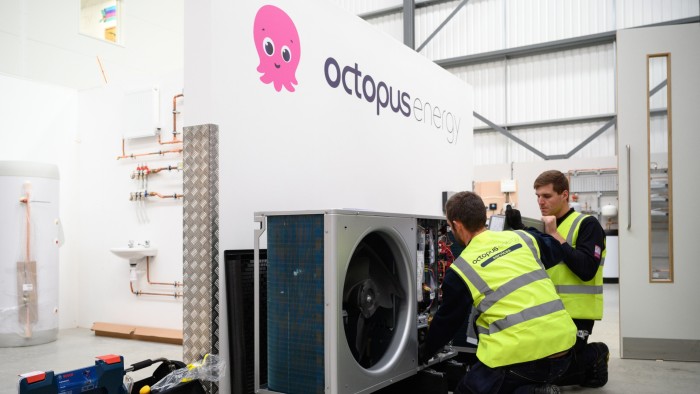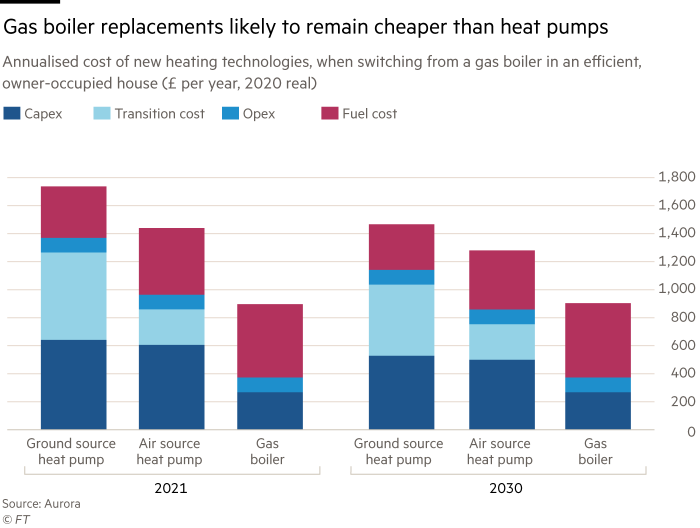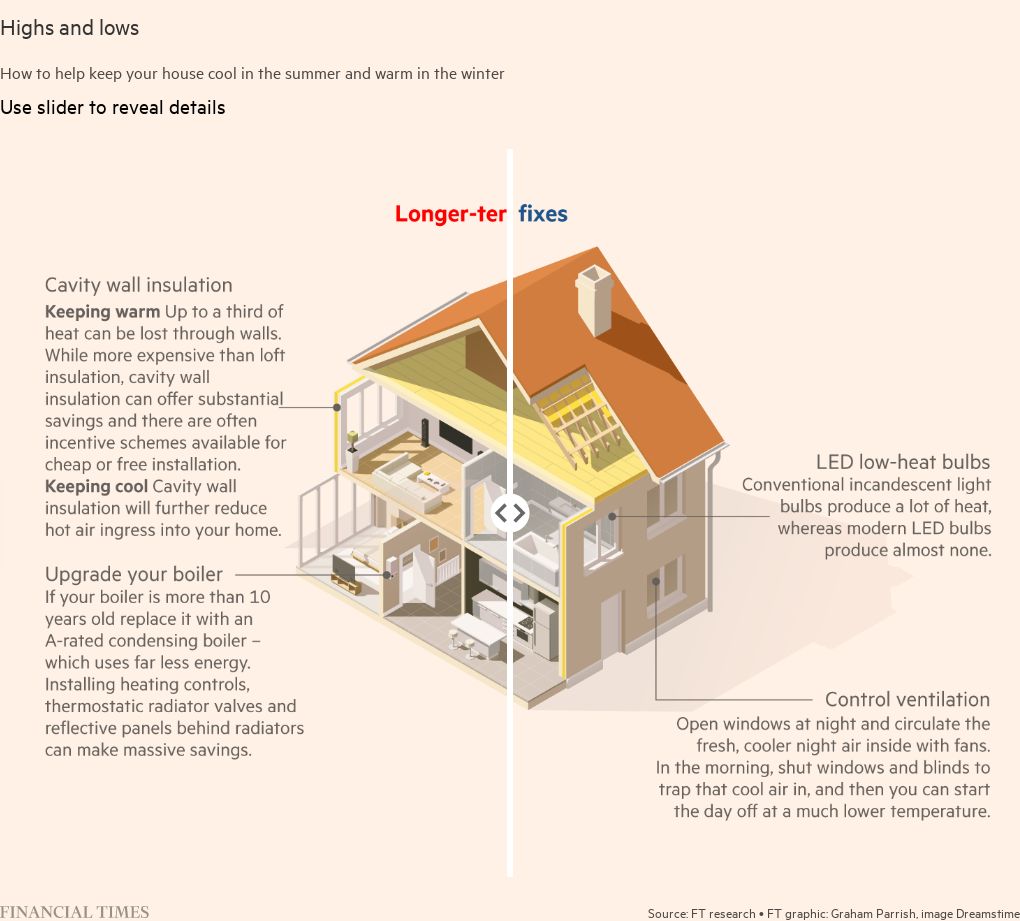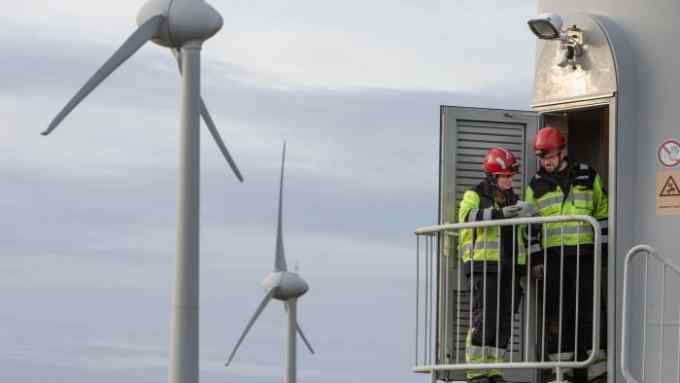UK consumers hesitate to install heat pumps

Simply sign up to the UK energy myFT Digest -- delivered directly to your inbox.
Joseph Raftery installed his first heat pump more than 30 years ago, after entering the heating industry in Ireland as an apprentice, aged just 16.
Now working for Samsung Climate Solutions in the UK, part of the wider Samsung Electronics group, he has seen how the equipment has developed. “The technology has had decades of evolution,” Raftery notes. “The kit that UK installers are getting their hands on now is a very, very refined bit of kit.”
But, in spite of all these advances, heat pump installations in Britain are lagging behind ambitions.
Heat pumps are designed to keep homes at a steady, ambient temperature throughout the day, by taking heat from the ground or the air around a property, increasing it, and moving it into the building. UK ministers set a target of installing 600,000 a year by 2028, in an effort to reduce the number of polluting natural gas boilers — currently the dominant source of heating in the majority of British homes.
However, official figures show that the UK government’s “boiler upgrade” scheme — which offers homeowners £5,000-£6,000 off the cost of a heat pump — had issued only 8,771 vouchers between 23 May last year, when applications first opened, and the end of November.
More uptake is needed as reducing residential carbon emissions — which are mostly derived from heating and cooking, and account for about a fifth of the UK’s total — will be critical to achieving the UK’s “net zero” emissions target by 2050.
Surveys by companies including Samsung and Centrica identify several barriers to the use of heat pumps, though. They range from consumer concern about upfront costs to potential disruption during installation, if changes to radiators, pipework or insulation are needed.

UK ministers have acknowledged these problems and committed £60mn to a “heat pump ready” programme to help accelerate the rollout. They also point out that an estimated 90 per cent of British homes are “technically capable” of being fitted with a heat pump. Nevertheless, in June, only 14 per cent of 4,000 UK adults surveyed by Public First on behalf of Centrica said they would choose a heat pump to replace their current fossil fuel system.
Energy companies and campaigners stress that innovations are making it easier for households to switch from boilers to heat pumps, which can be highly efficient if installed correctly.
While they typically operate at lower temperatures than gas boilers, higher-temperature models have recently been developed that may be more compatible with certain types of radiator.
Costs are also coming down. Last year, Octopus Energy launched a pilot with Lloyds Banking Group to offer Halifax mortgage holders heat pumps from as little as £2,000 — assuming homeowners would apply for grant funding under the government’s Boiler Upgrade Scheme. Then, in January, British Gas-owner Centrica said it would offer heat-pump installation from £2,999 — again, if government grant funding was sought.
But some of the innovation around costs needs to occur at a government level, argues Andrew Sissons, deputy director of the sustainable future programme at UK innovation agency Nesta.
“In general, in Europe, the countries which have the lowest ratio of electricity to gas prices are the countries that generally have the highest heat pump uptake rates,” Sissons says. “The cheaper your electricity is, relative to gas, the cheaper a heat pump is to run relative to a gas boiler.”
However, the UK “seems to have unusually expensive electricity relative to gas”, Sissons notes, as it adds more levies to electricity prices — such as surcharges to encourage the development of renewable energy — than to gas prices.
Ministers have been looking at addressing that imbalance. In addition, the government is examining ways of decoupling the price of electricity from gas. Under current market structures, gas-fired power stations set wholesale electricity prices most of the time, even though renewable sources — such as wind and solar plants, which generate electricity cheaply once built — are becoming more prevalent.
For Will Rivers, heat pump expert at not-for-profit consultancy The Carbon Trust, skills and training are two further barriers to accelerating installation rates.
“[Heat pump] technology is ready and up to scratch,” he says. “What needs to be improved is the training, standards and skills of the installer base and the quantity of the best engineers, to really make sure those heat pumps are being designed, installed and operated in the right way.”
A report by Nesta, published in June, estimated that there were only around 3,000 trained heat pump engineers in the UK, but at least 27,000 would be required in the next six years to keep the UK on track with its ambitions.
Ian Rippin, chief executive of standards body MCS Certified, says installers also need to have good design skills to ensure an appropriate heat pump is fitted and much of the heat it produces is not lost. Yet he feels design skills have “almost been forgotten” by the UK heating industry as gas boilers, which quickly deliver the desired temperature, can “cover up a lot of issues”.
“We see our installers, some of them are having to relearn or rediscover their design skills or work with a manufacturer who offers them design services,” Rippin says.
He adds that there is a “trickle” rather than a “tidal wave” of installers currently retraining, although MCS is trying to encourage new industry entrants to specialise in heat pumps and other “green” systems, through a low-carbon heating technician apprenticeship.
For Raftery, though, if the government provides the right signals about the future need for heat pumps, installers will follow.
The UK government’s net zero tsar, Chris Skidmore, made a start in January. He recommended that the government “regulate now” for the end of new and replacement gas boilers by 2033 “at the latest” — to “turbocharge” the adoption of heat pumps.
According to Raftery, “installers will keep ticking on until they get [to the point where they realise]: ‘Oh my homework is due, I had better go and do it.’”
Climate Capital

Where climate change meets business, markets and politics. Explore the FT’s coverage here.
Are you curious about the FT’s environmental sustainability commitments? Find out more about our science-based targets here


Comments